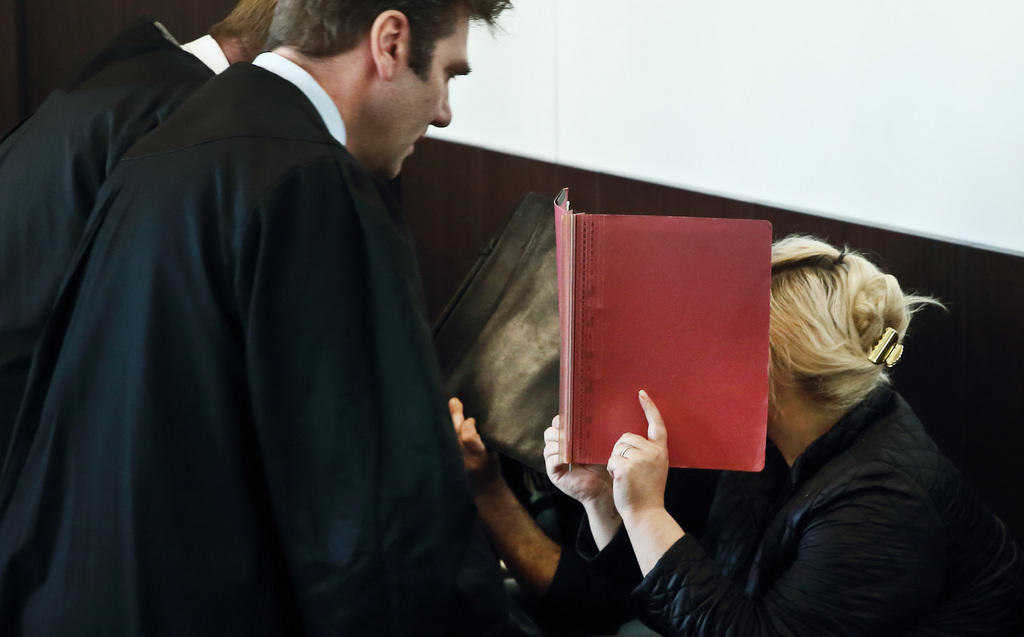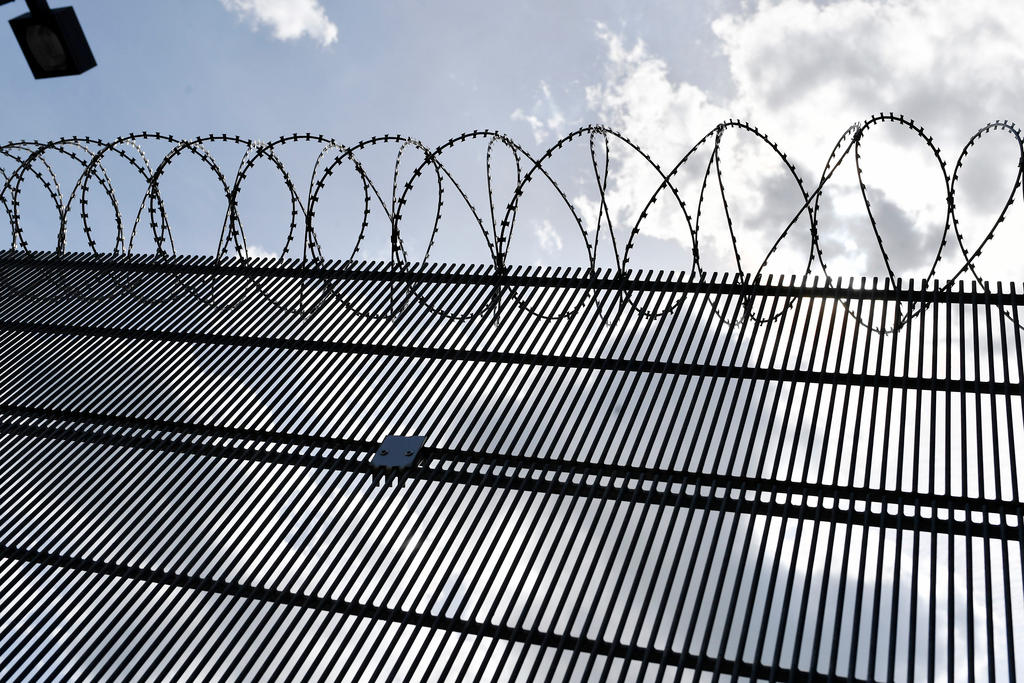Swiss prosecutors have power to hand down verdicts

Over 90% of sentences in Swiss legal cases are handed down by a prosecutor rather than a judge. How is this possible? The Swiss system relies heavily on “sentence orders” – a controversial but cost-effective procedure.
“Office of the Attorney General sentences Islamic State supporter”. This recent Swiss news headline may have surprised some foreign observers. Under the separation of powers principle, shouldn’t a federal prosecutor investigate and press charges, while a judge delivers the final verdict?
Switzerland is much more flexible in this regard. Under Swiss lawExternal link, prosecutors, including the Office of the Attorney GeneralExternal link, have the power to impose prison sentences of up to six months, as well as fines and penalties. The Office of the Attorney General even has the right to seize unlimited financial assets. Verdicts are issued in writing and without justification. Around 90-98% of criminal cases are settled in this way. Owing to the lack of exact figures, law professors Marc ThommenExternal link of the University of Zurich and André KuhnExternal link of the University of Neuchâtel have launched a Swiss National Science Foundation-funded projectExternal link to gather “facts and figures about sentence order proceedings”.
Taking it to extremes
According to Thommen, most countries face a similar problem of limited judicial resources. Many states have a system whereby the prosecutor can strike a deal with the defendant (Deals or Plea BargainingExternal link) or terminate proceedings subject to certain conditions. “There is an international trend to transfer the power to impose sentences over to the prosecutors,” explains Thommen.
+ Swiss prosecutor calls for introduction of plea bargaining
Switzerland has adopted this idea to the extreme. It is the only country where prosecutors have the power to impose a sentence without a judge being involved. In 1919, Zurich became the first canton to introduce a criminal procedure code which was later adopted across the country in 2011. There were some constitutional concerns during the legislative process, but most parliamentarians and stakeholders deemed it sufficient to grant a right to appeal against a sentence order. The fact that a defendant is entitled to appeal is a common justification for this system. The criminal procedure code, they argue, is only a “verdict offer” and not a verdict as such.
Case 1
A doctor was accused of conducting a heart transplant with an incompatible blood group which resulted in the patient’s death. He was convicted of manslaughter by criminal negligence by sentence order and had to pay a fine of almost CHF40,000 as well as a CHF5,000 penalty.
From shoplifting to murder
The only limit that Swiss law places on prosecutors is the penalties they can hand out, but not the kind of offences they can handle. A prosecutor can issue sentence orders for misdemeanours, but they can also decide on minor offences and more important crimes if they deem one of the penalties laid down in Swiss law is “sufficient”. Sentence orders were initially meant to deal with common petty crimes such as shoplifting and property damage. “Sentence orders are a prime example of the salami tactic often applied in Swiss law,” says Thommen. “It was supposed to be limited to dealing with petty crimes.” But little by little, it has been extended to crimes of greater importance.
Case 2
A man disseminated Islamic State propaganda videos and pictures via Facebook. The Office of the Attorney General sentenced him to six months’ imprisonment and a fine of CHF2,000.
A quick glance at the Swiss Criminal CodeExternal link shows the minimum penalties for crimes such as theft, embezzlement, serious bodily harm, euthanasia, infanticide (if a mother kills her child within a year of birth), desecration, human trafficking or manslaughter by negligence. Former federal judge Martin Schubarth believes that it would even be possible for prosecutors to decide in murder cases if the offender was of unsound mind. These cases are obviously much more severe than petty crime.
“Inquisition-like speed proceedings”
Switzerland’s scientific world views sentence orders with a critical eye. Schubarth questions whether they are not a step backwards to the times of the Grand Inquisitors. In an article in the Neue Zürcher Zeitung, the retired professor of criminal law Franz Riklin went as far as calling them “inquisition-like speed proceedings”. Back in 1919, a scientist criticised a Zurich sentence order saying the investigating officer was like an inquisition judge who was “prosecutor, lawyer and judge” at the same time.
Case 3:
A Swiss bank employee was accused of opening accounts for a high-ranking Argentinean football official. The employee also allegedly managed the accounts of an Argentinean sports marketing firm which used them to channel bribe money. The Office of the Attorney General sentenced him for document forgery as well as for violating the reporting obligation laid down in Swiss money laundering law. He had to pay a CHF30,000 fine as well as a CHF8,000 penalty. Another $650,000 were confiscated.
Thommen, who wrote a thesis on sentence orders, sees room for improvement. He is surprised the defendant must appeal to the attorney general. He feels it should be possible to go directly to the court, which would also put in place a controlling mechanism for the prosecutor’s office.
Another aspect which is often criticised, especially by journalists, is the lack of transparency and the fact that sentence orders are not readily available to the public. Files can be consulted, but the whole procedure takes a long time and can feel like an obstacle race. Hence the term “star chamber justice” (secret justice).
Fast, cheap and discreet
This procedure does have a huge advantage, though. It is fast and cheap for all parties involved, including the defendant, who Thommen argues can also enjoy discretion. “A sentence order can be very appealing for a defendant, as the hearings are not public and nobody finds out about the sentence,” he said. Sentence orders are usually displayed at the Office of the Attorney General for a few days but according to Thommen, nobody really consults them.
For this reason, Thommen doesn’t believe criminal procedures will disappear any time soon. “Any other system would be too expensive,” he argues. “A sentence order is a reality which we will have to live with.”
Different countries, different legal systems
There is probably no other developed country that has the same criminal procedure code as Switzerland. However, many countries have other means to speed up legal proceedings:
- Germany also has a criminal procedure code in place. Unlike Switzerland’s it only deals with misdemeanours. Sentences are usually imposed by a judge while the prosecutor’s office files the application.
- Austria has a mandate procedure entitling a judge to deliver a verdict without trial. Only misdemeanours can be punished with it.
- In Japan, a court can fine someone up to CHF10,000 in fast-track procedures at the request of a prosecutor.
- In Brazil, less serious “Juizado EspecialExternal link“ criminal cases are judged in oral sessions.
- Britain has a fixed penalty noticeExternal link. It was initially created for parking offences but is now applicable to a wide range of traffic and administrative offences. Only fines can be imposed within this system.
- US-style Plea BargainingExternal link is also gaining popularity in other countries.External link It involves negotiations between a prosecutor and a defendant whereby the prosecutor imposes a lesser penalty or drops other charges if a defendant pleads guilty. A judge must approve the deal.
Contact the author @SibillaBondolfi on FacebookExternal link or TwitterExternal link.
Translated from German by Billi Bierling

In compliance with the JTI standards
More: SWI swissinfo.ch certified by the Journalism Trust Initiative













You can find an overview of ongoing debates with our journalists here . Please join us!
If you want to start a conversation about a topic raised in this article or want to report factual errors, email us at english@swissinfo.ch.